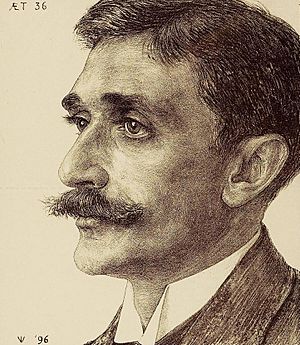Willem Johannes Leyds facts for kids
Quick facts for kids
Willem Johannes Leyds
|
|
|---|---|

Portrait by Jan Veth, 1896
|
|
| State Secretary of the Transvaal | |
| In office 1 May 1889 – 31 May 1898 |
|
| President | Paul Kruger |
| Preceded by | Willem Eduard Bok |
| Succeeded by | Francis William Reitz |
| State Attorney of the Transvaal | |
| In office 13 October 1884 – 1 May 1889 |
|
| President | Paul Kruger |
| Preceded by | Eduard Pieter Jorissen |
| Succeeded by | Ewald Auguste Esselen |
| Personal details | |
| Born |
Willem Johannes Leijds
1 May 1859 Magelang, Dutch East Indies |
| Died | 14 May 1940 (aged 81) The Hague, Netherlands |
| Citizenship |
|
| Spouses |
|
| Alma mater | University of Amsterdam |
| Awards |
|
Willem Johannes Leyds (born May 1, 1859 – died May 14, 1940) was a Dutch lawyer and an important government official. He worked as the chief legal officer and then as the main secretary for the South African Republic. From 1898 to 1902, during a very important time called the Second Boer War, he was the country's special representative in Brussels. He worked to get support from other European countries.
Contents
About Willem Leyds
Early Life and Studies
Willem Leyds was born in Magelang, which was then part of the Dutch East Indies. His parents were Dutch teachers. After his father passed away, his family moved back to the Netherlands. He went to the University of Amsterdam to study law. He was a very good student and graduated with high honors.
Some of his teachers suggested him for a job in the South African Republic. The president of that country, Paul Kruger, was looking for a new chief legal officer. President Kruger had been traveling in Europe after his country had become independent from the British, after the First Boer War. At first, Leyds wasn't sure about the job, but he accepted it. He and his wife, Louise, then moved to Pretoria.
Working in South Africa
As the chief legal officer for the South African Republic, Leyds was in charge of the country's legal cases. He also helped start the Netherlands–South African Railway Company, which was a big project. Leyds quickly became a trusted helper for President Kruger. In 1888, he was promoted to the main secretary of the growing country.
In 1896, Leyds had health problems with his throat and traveled to Europe for treatment. When he returned to Pretoria, he decided to step down as main secretary because his health issues kept coming back. Francis William Reitz took over his role. Leyds then went back to Europe to work as a diplomat for the South African Republic in Brussels.
Diplomat in Europe
During the Second Boer War, Leyds worked as a diplomat for the South African Republic. He tried very hard to get other countries to support the Boer people, but he was not successful. His work as a diplomat ended when the war finished with the signing of the Treaty of Vereeniging.
In 1904, he went with President Paul Kruger's body back to Pretoria after Kruger passed away in Switzerland. After returning to The Hague, Leyds wrote a book about the history of the South African Republic. His first wife, Louise, died in 1907. In 1910, he married Anna, the daughter of a Dutch official from the island of Java in the Dutch East Indies.
Leyds's Legacy
While he was the main secretary of the South African Republic, Willem Leyds received several important awards. These included the Dutch Order of the Netherlands Lion, the German Order of the Red Eagle, and the French Legion of Honour.
For his important work on South African history, Leyds was given special degrees from the University of Pretoria and the University of Stellenbosch. Jan Smuts, who was a Boer general and later a South African Prime Minister, said that Leyds was one of the most important people in the history of Transvaal, second only to President Kruger. The old gold rush town of Leydsdorp in Limpopo is named after him.
 | James Van Der Zee |
 | Alma Thomas |
 | Ellis Wilson |
 | Margaret Taylor-Burroughs |

